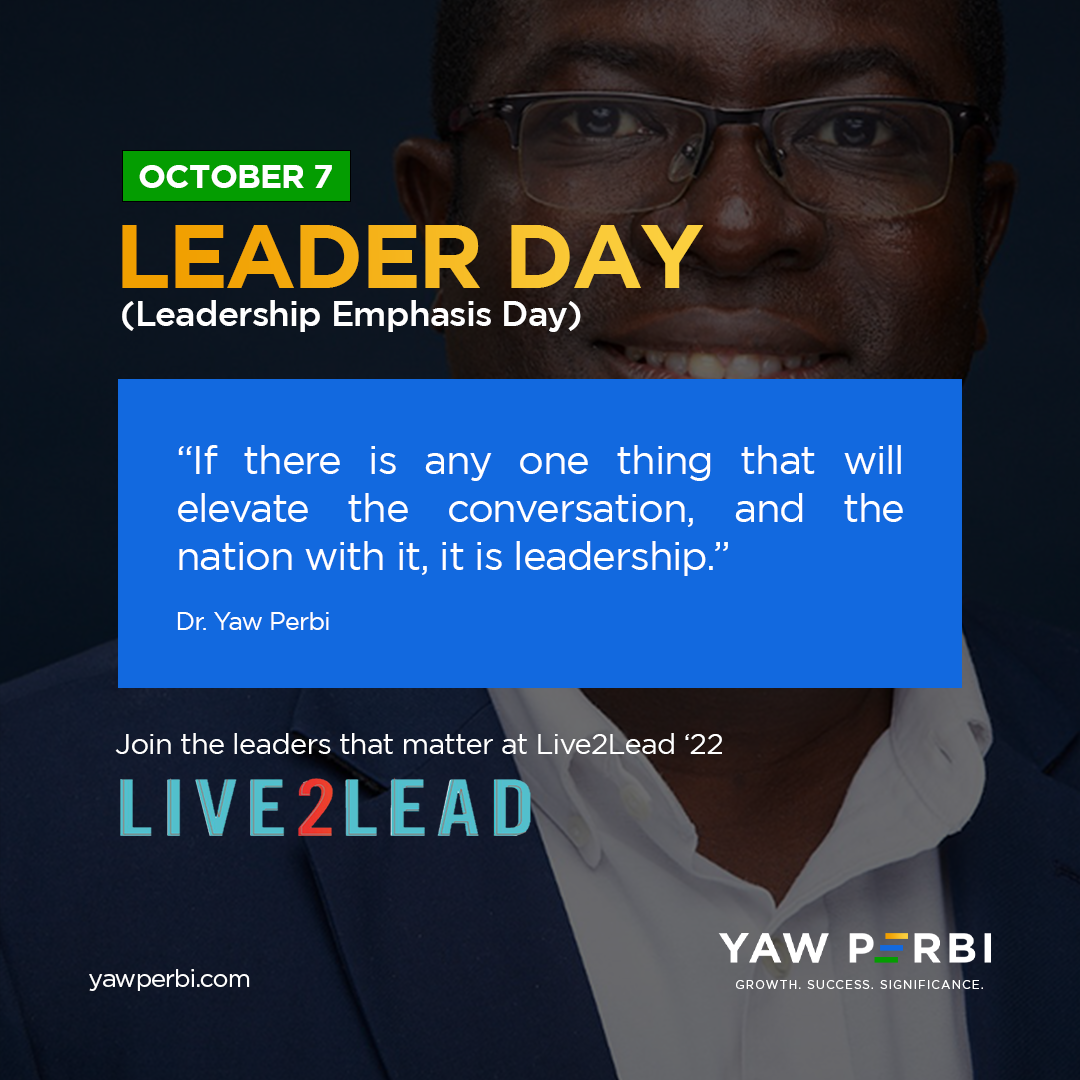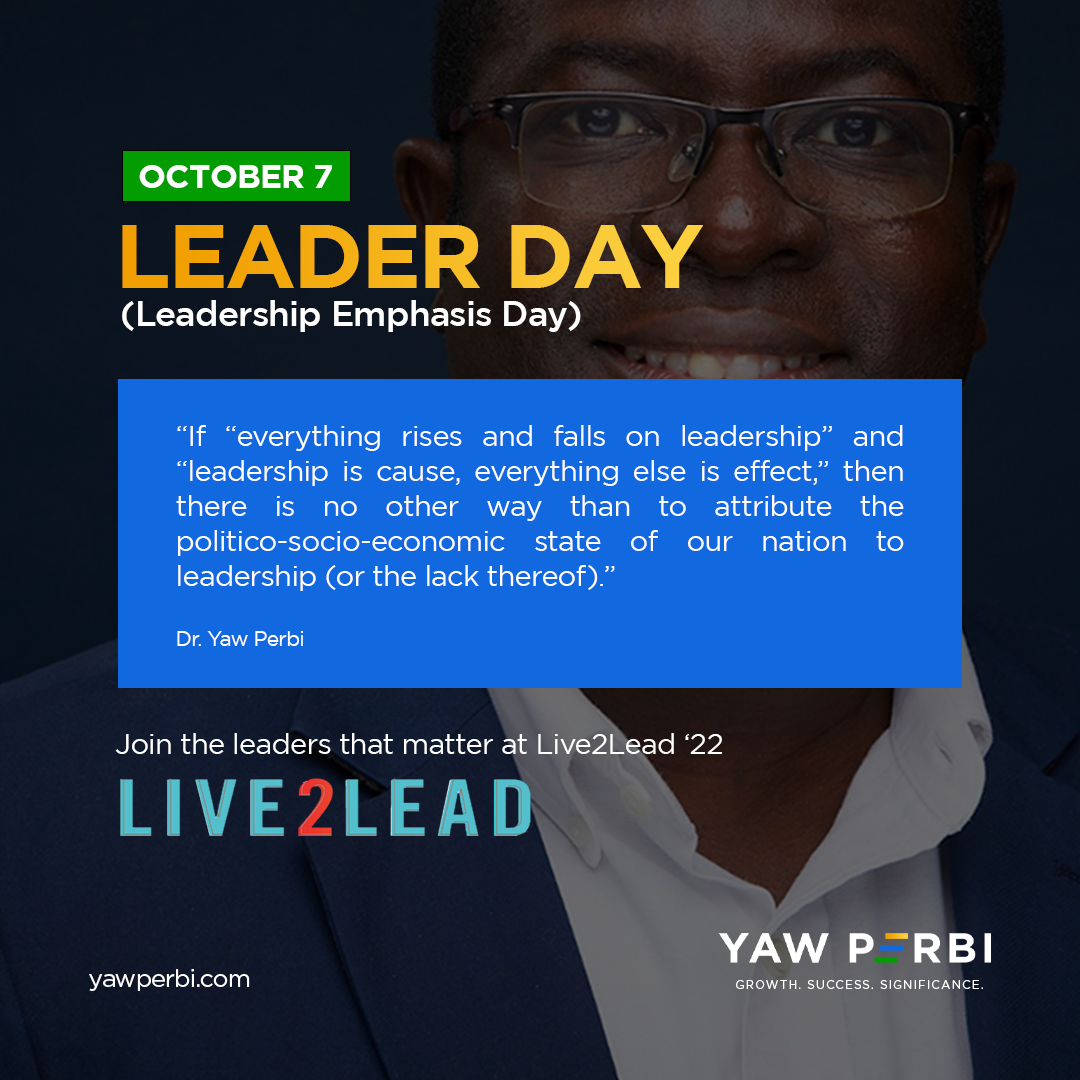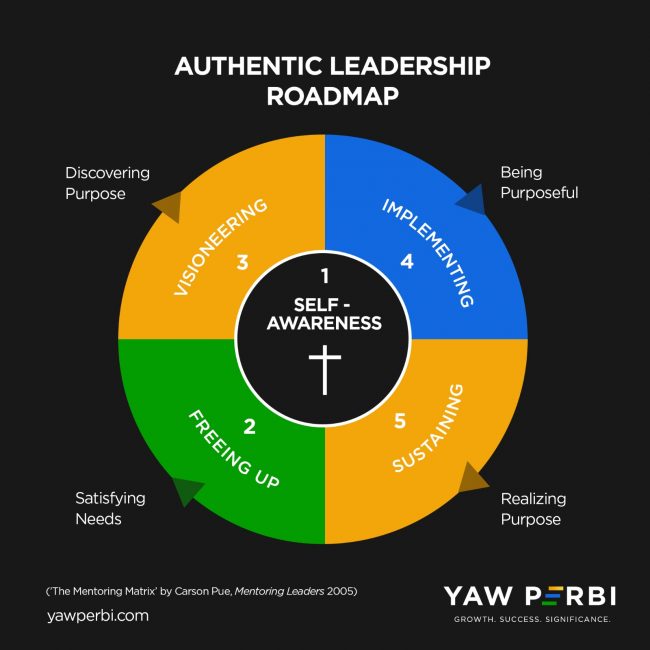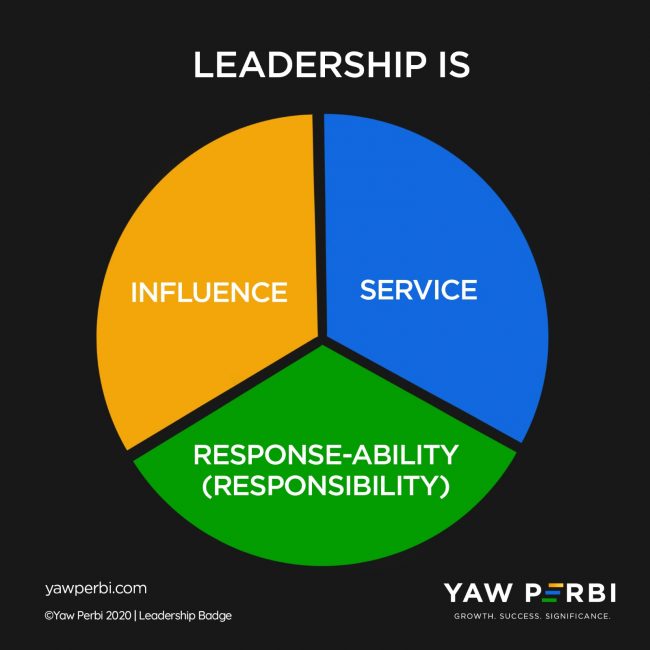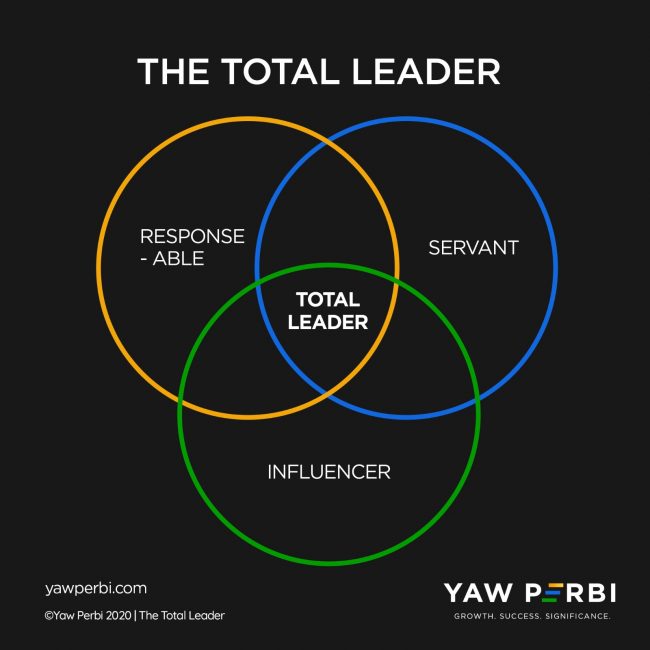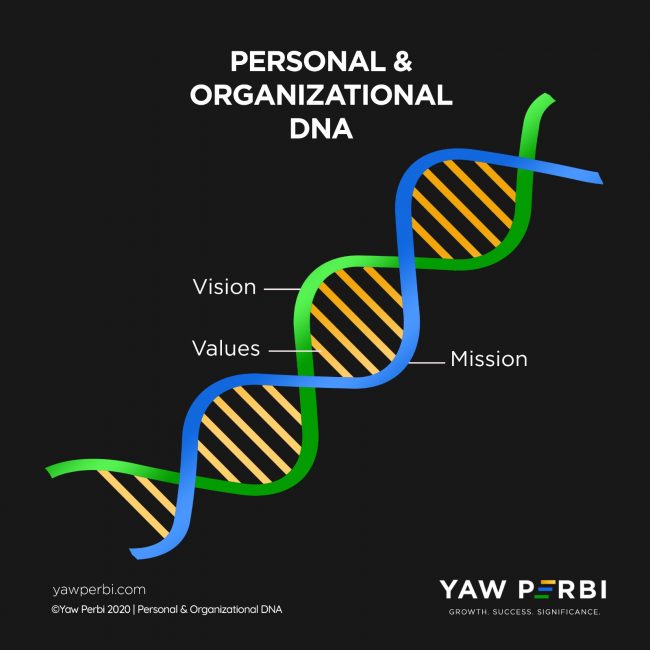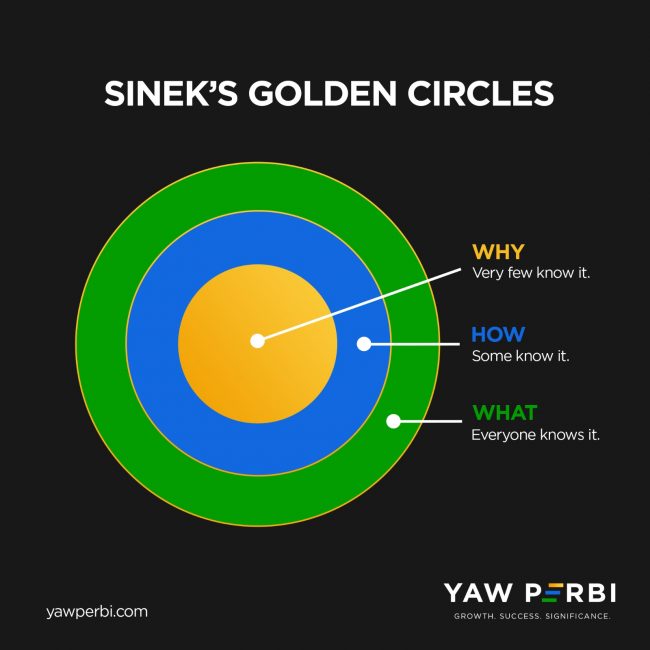
Raise the Roof, Lift your Lid!
I just arrived at my room in Cape Town after three flights from Accra to Nairobi, Nairobi to Johannesburg and Jo’burg to Cape Town. A question on my mind as l flew here far above sea level, sometimes as high as 38,000 feet, has been, “How high is your leadership lid?”
THE FIRST OF THE IRREFUTABLE LAWS OF LEADERSHIP
Of course you know what a lid is, the cover of a container. How high your lid is determines the quality of the leadership that you provide for those you lead. I learnt this a long time ago, some 20-25 years ago from John Maxwell’s 21 Irrefutable Laws of Leadership. It was the very first of the principles of leadership he espoused in that bestseller and my life has never been the same since.
As John challenged me then from the written word—and many years later in-person—I must always endeavour to lift my leadership lid because no family, organization, church, community or country would ever grow past their leader. The leader is the lid over those (s)he leads. Sometimes when training leaders I ask, “are you a leader or ‘lidder’? because a leader is literally the lid on the progress and prosperity of their constituency. In a sense, every leader is a lidder; the question is “how high?”
IMAGINE THIS PRESIDENTIAL LID
You probably have heard me tell the story of a certain African president that a group of us, Maxwell certified leaders, were trying to connect in-person to John C. Maxwell for a national transformation process and programme. This president had never heard of John. In all probability, he hadn’t read any other contemporary leadership experts but hopefully he has digested at the very minimum some of the leadership classics like Plato’s, ‘The Republic’. It is a scary thought that this African nation—and by extension every family, organization, corporation, community, church etc. within her—would be constrained by the tightness of this head of state’s lid. I almost added, “through no fault of theirs,” but I guess they voted him into power.
HOW TO LIFT YOURS
While we educate a new generation that should be too enlightened to allow such tight lidders to lead African nations in the next decade, let me ask you, let’s get personal: how high is your lid? We forget, many of us (or we might even not know), that leadership is not just caught, it must be taught. And that’s why I love the opportunity, come October 07, for us all to be part of a life-altering, lid-lifting Live2Lead virtual experience with local faculty and global ones beaming all the way from Atlanta, Georgia.
We are gunning for 2,000 leaders—from emerging (youth) leaders, through leaders in the establishment (i.e. government/public sector leaders) to established leaders in the private sector, including executives from the corporate space. We will be taught in word and deed by powerful speakers and shakers like John C. Maxwell himself, two Patricks (Lencioni of the USA and Awuah of Ghana) and a Patricia (CEO of Vodafone, Ghana).
RAISE THE ROOF!
One of the most powerful discoveries in psychology over the last generation has been that people can learn and grow and change! So wherever your lid is today, if you learn to lead better you provide more room for those you lead. John will be the first to tell you that “your capacity determines your impact.”
Perhaps, some of the conflicts you are experiencing right now in your organization, church or wherever you lead is because your lid is too low and so people keep hitting it. And there is going to be continued tension and banging (conflict) till at some either you leave the stage or your people take their exit. As you have probably heard it said, people join organizations but they leave people (managers/leaders). It’s time to make room, lift your lid, raise the roof!
I have been part of things l left because the lid was too low. It just wasn’t life giving and l know people have also left my leadership when my lid was low because it was just too tight. Learn to lead. Each one of us can learn to lead better. Blow off the lid so that all of a sudden the people under your leadership feel this space and freedom because you lifted your lid and now they can breathe and create and innovate and… live again.
Join us at Live2Lead Ghana 2022, on October 7, and let’s all learn to lead better so that the people following our leadership can live better. If leading is your purpose on earth—that you live2lead—then you might as well as learn2lead, and do it well. As Donewell Insurance puts it, “If it must be done, it must be done well.” If we must lead, then we must lead well. Let’s blow off some lids and see our constituents blessed beyond measure, growing great and strong.
Right outside my hotel room window is the breathtaking view of the majestic, towering Table Mountain at 3,500 feet above sea level with no real ‘peak’ per se. No lid! So in the meantime, while you contemplate your lid, I will enjoy Cape Town on your behalf.
Post Script
Register and join LivetoLead here.
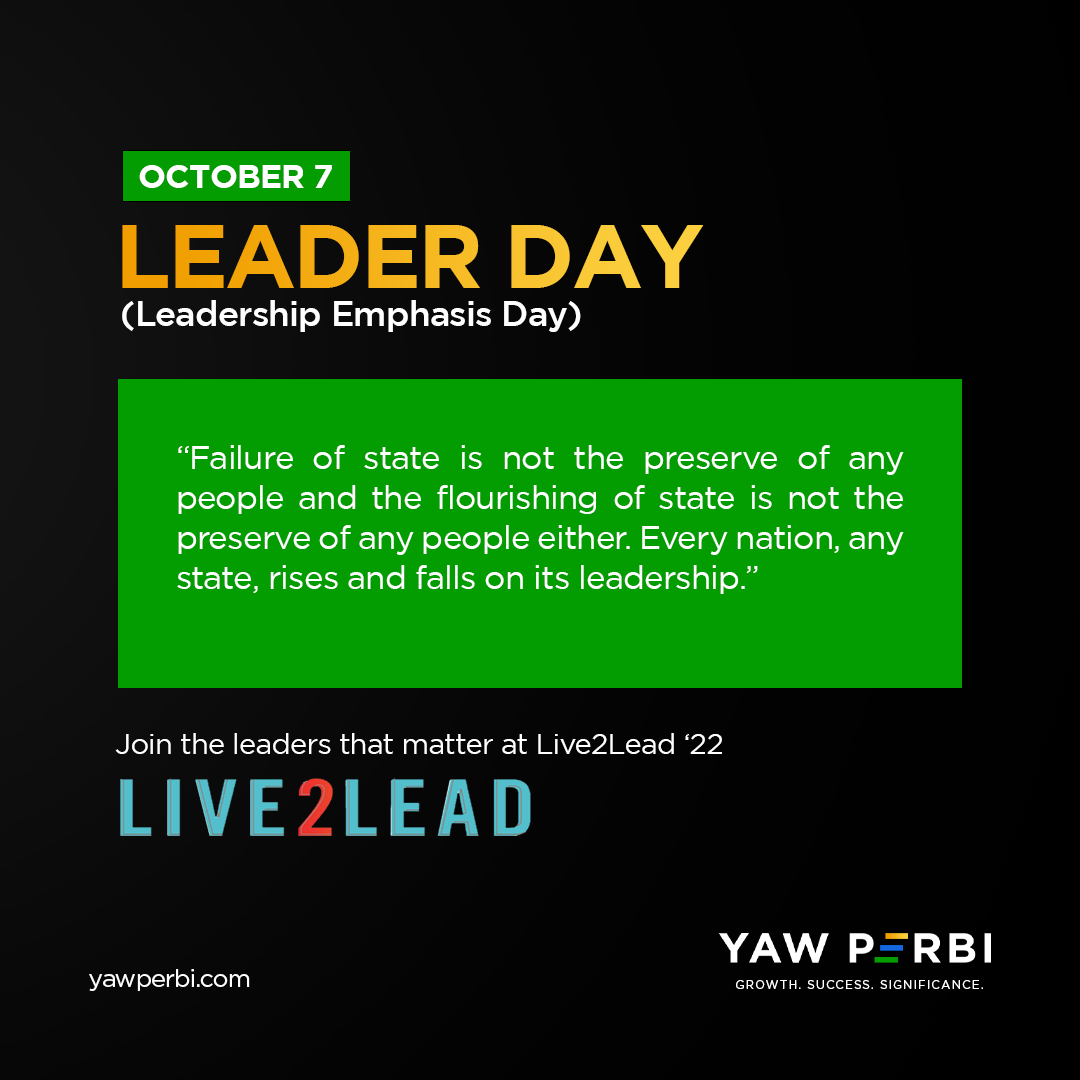
Of Principles, Principals & Principalities
This is a true story: A few years ago, a handful of us John Maxwell-certified coaches and trainers from Africa were trying our possible best to get John, the world-famous leadership expert, to visit a particular African country and engage their president. A good number of Maxwell-certified leaders have been travelling with John to specific developing countries to engage them in a bottom-up transformation process that have done these nations some real good and we hoped same for this African nation with great potential. But John doesn’t come cheap. In fact, one of us was serious enough about this that he cashed in part of his 401k (retirement savings in the U.S.) to make this trip possible. It was such a struggle to gain access to the president, like pulling teeth! Eventually we did. To my ‘shock and awe’ (just remembering U.S. President Bush Jnr.), this African president did not even know of John Maxwell! That is when I knew the country wouldn’t do well. And I was right.
LEADERSHIP IS THE TIDE
Over the last few years, especially with the Trump presidency and with the advent of social media proliferation, many of us have seen parts of the United States that we have never seen before. Horrible parts and horrific things—whether it is the wicked knee of a policeman on George Floyd’s neck or violent street protests or the infamous January 6 ‘insurrection’ or whatever it is. We had all this exposure to things we could not hitherto have imagined occurring in the ‘greatest nation in the world.’ At the peak of these happenings, during the Coronavirus pandemic, I frantically tried (see January 2021 article) to get some of my American friends to appreciate that Africans are no less human or merely more stupid than they are, and that if there is a difference between their economic status and my motherland’s it was just because, “everything rises and falls on leadership.” Leadership is the tide the raises all the other boats in a society (or otherwise). Most of them, I perceived, didn’t still quite get me.
AFRICA IS NOT THE PROBLEM
Just like we’ve seen in the last few years in America, we’ve also seen in several countries in Europe how “leadership is cause; everything else is effect.” I’ve lost count of how many Prime Ministers Britain has had in the last little while, and we all witnessed with horror the leadership (or the lack thereof) of the last one with the Russian first name. Africa is not the problem, leadership is. Failure of state is not the sole preserve of any nation neither is the flourishing of state the preserve of any nation. Every nation, any nation, rises and falls on its leadership.
“WE THREE KINGS”
These three kings are at work in nation building: Principles, Principals and Principalities. If you like, these actors are Laws, Leaders and Luciferites. Principles are neutral, Principals are supposed to be working for their people while Principalities are against. There are principles that touch on every aspect of life, including leadership. When these principles or laws–which are timeless, universal truths–are lived out, nations do well, families flourish, churches and organizations prosper. When they are broken we don’t.
It is easier to appreciate the physical and chemical principles because we can see and feel and touch them and their consequences. The Law of Gravity is the commonest example of a principle of Physics (physical law). There are leadership principles as well. Many of these are intangible in their operation but produce very tangible effects reflected in socioeconomic and other indices. Nations that live by principles, these consequential laws of the universe that make this world run properly, prosper and nations that do not live by principles don’t. The nations whose principals (leaders) live by these principles prosper; those that don’t do not suffer. It bears repeating that this applies to families, communities, churches, organizations… you name it.
WHERE DEMONS COME IN
Of course, those of us who believe in spiritual things know that over every nation and territory there are also what we call Principalities (Lucifer’s forces). These ‘Luciferites’ (I call them), are spirits that have territorial control that want to oppress nations and not let them come to their full manifestation. Why, you may ask? Out of envy of humans and out of spite for their Creator. But guess what? If you have principals (leaders) who live by principles (laws), including spiritual principles on how to deal with these powers, those nations, those families, communities, churches, organizations and countries of such leaders would bloom.
STOP THE BLAME GAME, NOW
Africans! let’s stop blaming how socioeconomically bereft we are on Principalities. It is our lack of following Principles—all of us—and particularly the lack of our principals leading in a principle-based manner as they should that has landed us where we are. We have an opportunity on October 7, all of us, to learn more of these principles as principals, whether we are executives in companies, pastors of churches, student leaders, public sector actors or whatever. We must all learn to lead better. When the leader gets better everything everyone else gets better.
It’s time to take on the principalities (Lucifer’s powers) that are oppressing and not making us prosper as nations and communities and it would come from the principals (leaders) who would live by the principles (laws) of leadership and lead the rest of us to do same. Don’t blame the principalities—and you can’t blame the principles either—it all lies on the principals. Principles are fundamental laws that cannot be changed and must be lived by to prosper. Principalities are spiritual powers that can be challenged to let things “be on earth as it is in heaven.” Neither principles nor principalities are respecter of persons, whether principal or peasant. Nations with great principals (leaders) abide by principles (laws) and defy spiritual principalities (Luciferites) to make their nations prosper. How laudable is your leadership?
Remember the nation whose principal-in-chief was clueless about leadership principles, at least as taught by Maxwell? I feel sorry for his people as I see and hear of their plight each day, worsened by the Coronavirus invasion of our planet. It’s not the devil; it’s our leaders. As one medical colleague pursuing Paediatric Pulmonology in South Africa poignantly commented on my PEP Talk on YouTube about this matter, “Once our Principals follow Principles and we the led are inspired, we will be too busy prospering to blame Principalities.” Enough said. Are our principals hearing?
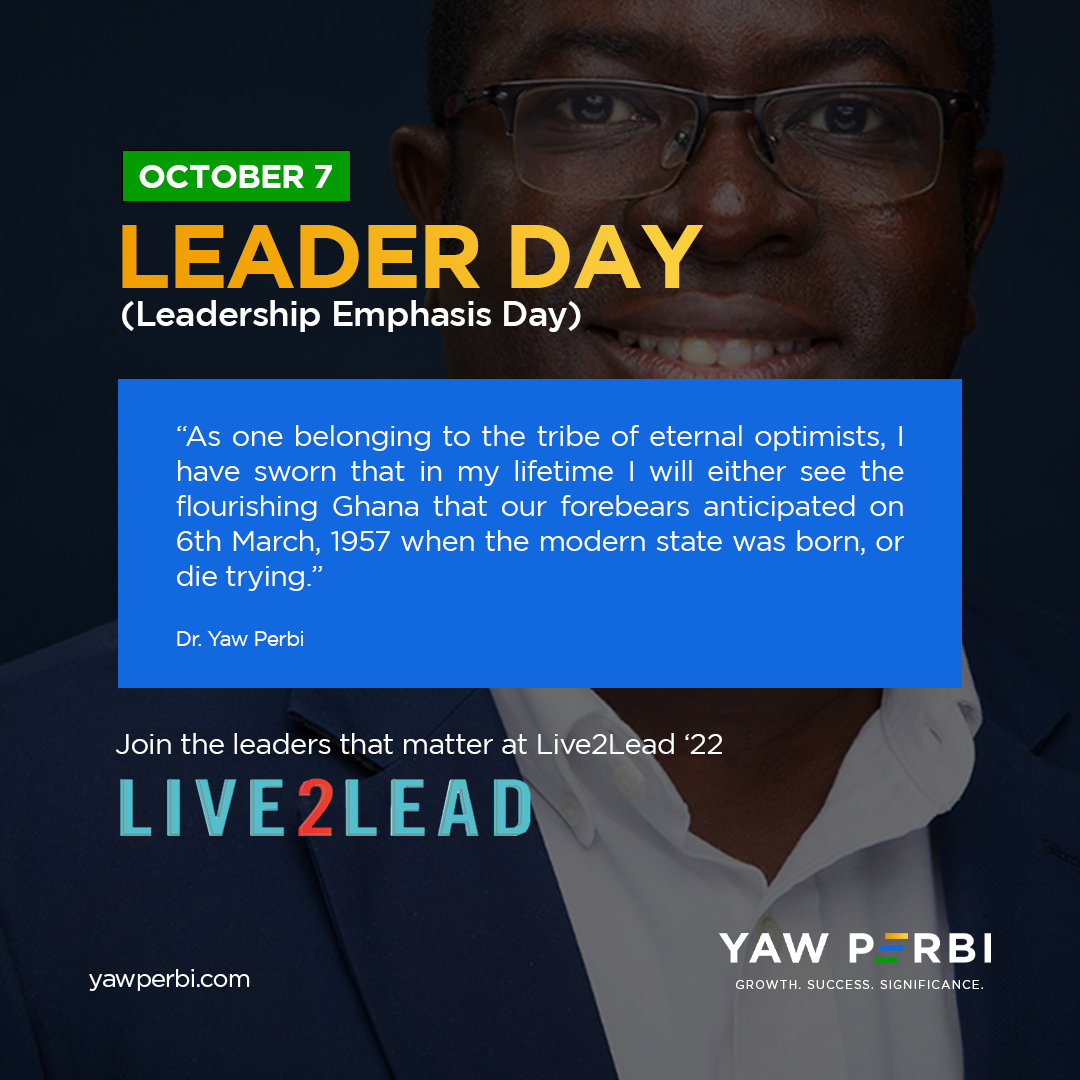
Leader Day, October Day
The world is not in a good place. Leadership is the cause. And when it comes to Ghana’s situation in particular, I have personally been shocked at the number of C-level leaders I have interacted with that have either completely lost hope in the future of the country or nearly have. “How did we get here???” one CEO of a major bank asked me (yes, with three question marks).
If “everything rises and falls on leadership” and “leadership is cause, everything else is effect,” then there is no other way than to attribute the politico-socio-economic state of our nation to leadership (or the lack thereof). In the same way, if there is any one thing that will elevate the conversation, and the nation with it, it is leadership.
DO OR DIE TRYING
As one belonging to the tribe of eternal optimists, I have sworn that in my lifetime I will either see the flourishing Ghana that our forebears anticipated on 6th March, 1957 when the modern state was born, or die trying. When the nascent nation was named ‘Ghana,’ our great grandparents were hopeful it would reflect the prosperity of the old Ghana empire, hence our new name (from Gold Coast). Oh, it bears repeating: our tribe of eternal optimists will see to a prosperous Ghana in our lifetime or die trying.
“I HAVE A DREAM, I HAVE A DREAM…”
Every true leader has a dream they passionately pursue with their people. I realize there is a day dedicated to almost every cause under the sun and Sustainable Development Goal—women’s day, water day, literacy day, friendship day, founders day … even toilet day. Yet the one thing that makes each of these causes to rise and fall has no such day dedicated to it to elevate and emphasize it. Is a day enough? Surely not; but it is a good catalyst for the remaining three hundred and sixty four or five days.
My fellow Maxwell-trained and certified collaborators in Ghana and I have a dream that ultimately the first Friday of October each year will become universally known as LEADER DAY. There is nothing special about the first Friday in October per se except that consistently for about a decade now, our mentor and leadership expert, John C Maxwell, has been gathering some of the best leadership minds and hearts on the planet to speak to the issue, and we might as well leverage the opportunity rather than reinvent the wheel. Live2Lead is the name of that event. The name says it all, that’s our purpose on earth: We live to lead.
Gwen Addo, the pulchritudinous CEO of the Hair Centre and speaker at Live2Lead Ghana ‘22 affirms this vision: “I also pray your dream comes true and October 7 becomes a “leadership day” or perhaps October becomes a “leadership month.”” She continues, “leadership is close to my heart … and why not dream it bigger than just a day.”
You and I know the dearth of leadership in our country. We Maxwell certified trainers who are Ghanaian are aiming to get 2,000 leaders at all levels to benefit from the LIVE simulcast from Atlanta. We will organize local content for our context first, sandwiching the global feed. You would want to be with Patrick Awuah (Founder & CEO, Ashesi University), Patricia Obo-Nai (CEO, Vodafone), Uncle Ebo Whyte (CEO, Roverman Productions), Gwen Gyimah Addo (CEO, The Hair Senta), Kathleen Addo (Chairperson, National Council for Civic Education) and Kwamina Asomaning (CEO, Stanbic Bank). The core issue on the table this time, or shall I say by the fireside, is “Leading with Integrity & Inspiring Hope, for the Common Good.”
STRATEGY
On October 7, we shall convene 2,000 Ghanaian leaders online. At least half of them will be from 100 companies, institutions and organizations which would send 10 of their leaders to Live2Lead as their investment in themselves as well as boldly staking their claim in the prosperity of Ghana by raising the leadership lid in the country, one company at a time. All these companies will be listed as patrons in the event handbook, website and social media (in alphabetical order).
The other half will be made up of executive leaders from the private sector, the establishment leaders (public service) and emerging leaders from our schools and universities, representing the next generation. Companies, institutions and organizations which want to go beyond patron status will be given opportunity to sponsor the establishment and emerging leaders in exchange for significant air time and eyeballs.
This 2,000 is only starters; we shall double in 2023; and double again and again till at least 2% of all leaders in Ghana are connected to this Live2Lead tribe of learners who lead and leaders who learn. That is the exact critical mass need to see a self-propagating movement of leaders worth following in Ghana.
CONCLUSION
The feedback from the ground as I’ve gone around is damning. Ruinous to the extent that although the theme we initially chose for our local content is ‘Leading with Integrity for the Common Good,’ we’ve had to come up with a conjoint theme of HOPE. Our people need hope. Leaders are brokers of hope, thus when they themselves are broken to the extent that they have no hope, what shall the rest of the people do?
Arise Ghanaian leaders!, established and emerging ones alike. We are better than this. Yet perhaps we are expecting leadership behaviours, values and attitudes that we haven’t first trained into people. Since we Live2Lead (that’s our purpose) let’s then Live2Learn (that’s the process) so we can all lead better and all make our nation great and strong. When the leader gets better, everyone and everything else does too. So let’s all show up!
One day in October, for starters. Just one day but who knows? Perhaps ‘October Day’ will in my grandchildren’s day be as well-known as ‘May Day’ is today. And for even better reasons, leadership-wise.
PS.
An event is not enough for sustained transformation thus there are leadership development and training pathways that will later be shared as a follow-up process between October 7 and the next Leader Day a year hence.
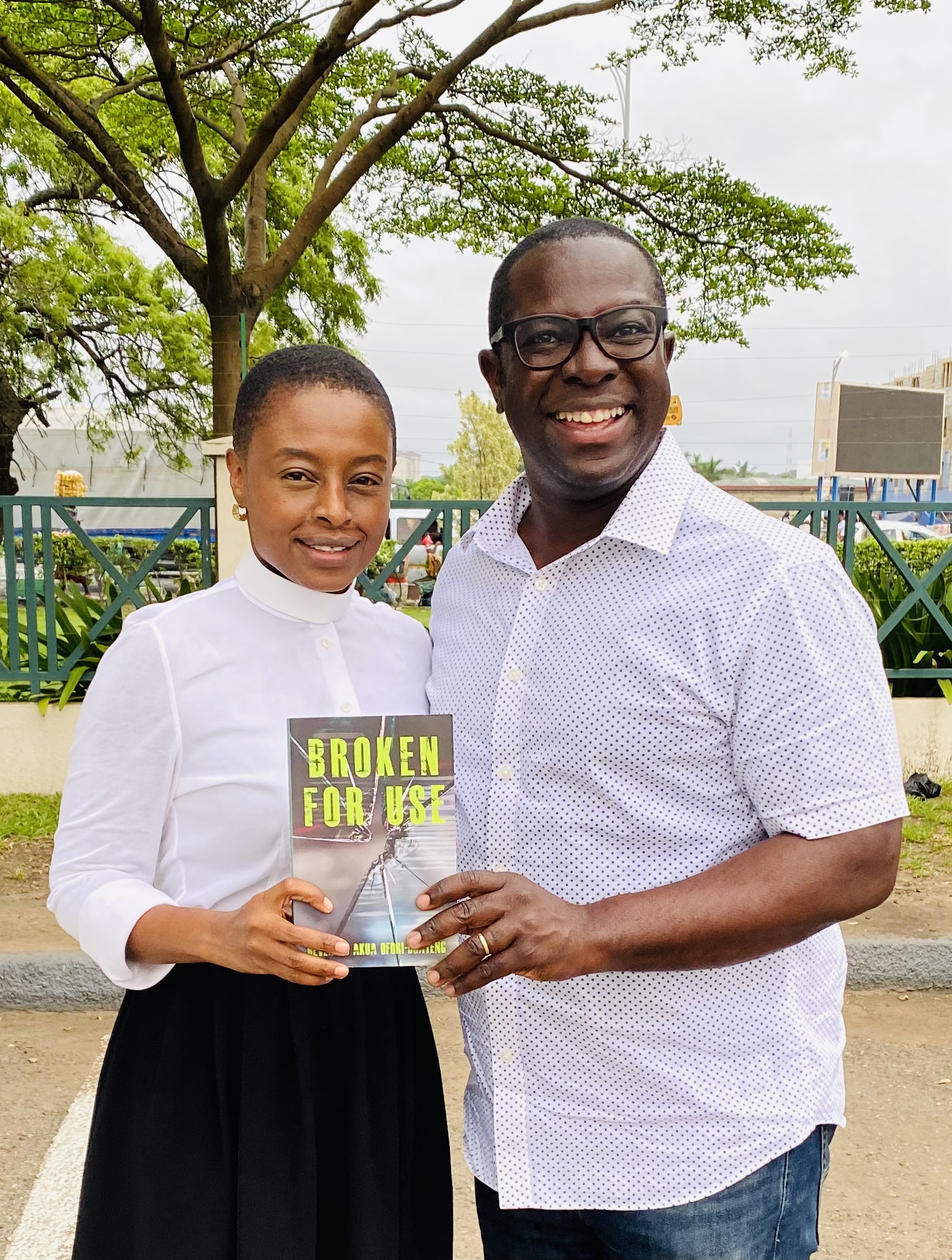
Leading From Life Story
Leadership is an interesting phenomenon. It is a more personal phenomenon than many people realize. I have been studying leadership for a while, at least for the last twenty-five plus years, and one of the greatest discoveries for me has been that leadership is not something ‘up there’ or ‘out there.’ The greatest leaders have been those who have been able to deeply reflect on their life stories and reframe them, leveraging their life stories to lead.
Growing up in Ghana as a student of leadership, a lot of the apt illustrations and gripping stories I consumed were foreign, mainly coming from Western literature and audiovisuals. A case in point is Howard Schultz, CEO of Starbucks, as one of the best examples of how the corporate success of Starbucks is as a result of the reframing of his own life story, especially his dad’s misfortunes. Says Mr. Schultz himself, “The reservoir of all my life experiences shaped me as a person and a leader.” Now, I am really excited that many more Africans are telling their leadership stories and writing, putting them in print. Finally, the lions are learning to write their own tales of the hunt.
MEET THE MECHANICAL ENGINEERING MBA
One of the CEOs in Ghana whose life story has taken a firm grip on me is a young lady I’ve just come to love. First, she’s just an amazing human being, very authentic. Then Akua is a professional in her own right, with a Masters in Mechanical Engineering, an MBA, a third seminarian masters and actually studying for a Ph.D as well. But the icing on the cake for me is this: she is a priest too!
The fascinating story of Rev. Akua Ofori-Boateng is chronicled in her thrilling autobiography aptly entitled ‘Broken For Use.’ It is raw, real, and very vulnerable—perhaps the most vulnerable Ghanaian, or maybe even African, autobiography that I have read.
Akua is CEO of Aequitas, an organization desirous to see every youth find and pursue their passion. She and her team do this by providing internships and safe learning spaces for youth to explore, discover their gifts and find their purpose. And when you have read her story—the intriguing tale of a privileged, middle-class girl yearning for approval—you will immediately understand why she would found and lead such an organization—from her life story!
WHY LEADING FROM LIFE STORY MATTERS
The passion and purpose of your leadership would come from your life story. If you are going to have dedication and commitment to leadership, it will need to come from leading from your life story. If you are going to have inspiration and motivation, it comes from your life story. If you are going to have a true north for your leadership, it comes from your life story.
I am exceedingly glad to be collaborating with her at YAW PERBI to impact youth and C-Level Executives because authentic leadership comes from leading from your story. Watch out for opportunities for collaborative training, coaching, workshops, publishing etc. with the Rev. when it comes to this whole area of authentic leadership. Just before wrapping up lunch with her the other day, I wanted her to share with you why she wrote this book and what it means for her life and leadership. You may watch the short, unrehearsed and upstaged video I captured here or read a transcript of her convincing spiel below:
Rev. Akua Ofori-Boateng: I wrote this book because when I was young and struggling with my own insecurities and challenges, I didn’t have any book like this to read, anything to tell me of that what I was going through was normal and that anybody had been through such. Certainly no one my age was talking about it from being that age. I wrote this so that young people who are struggling and unable to forgive themselves and have made some of the mistakes I made would recognize that we all make mistakes and that there is life after mistakes. The life after mistakes is a good life and a fulfilling one and a life that can benefit other people.
Dr. Yaw Perbi: How has your life story shaped your leadership?
Rev. Akua Ofori-Boateng: My life story and my leadership are inseparable. For me, I lead from a place of what I have experienced. And I want the young people to understand that you are not talking to perfection. You are talking to a person who is giving you advice based on their own issues, mistakes they have made and overcome so I lead from a place of authenticity. I got it wrong and now I’ve got it right; and if you got it wrong, you can get it right too.
CONCLUSION
Notable leadership experts from Bobby Clinton to Bill George have divided life into phases, usually three or four. It takes deep reflection to draw these out for oneself. The power of leading from life story is one of the many reasons why self-awareness is a sine qua non in leadership. There is no authentic or deep leadership without knowing one’s life story and reframing it as a source of inspiration, dedication and commitment, passion and purpose for your leadership. Your best leadership will not come from trying out a long list of characteristics of great leaders or even emulating outstanding ones, but from deeply reflecting on and leveraging your own life story. It will come from ‘in here’. The raw material needed for great leadership is found in your own life story. What a fascinating paradox that the outward journey of serving and influencing others first begins with a leader’s own journey inwards and backwards, drawing from the power of their own life story.

THE PRESENCE ~ Part 3 (of 3)
Do you know the story about the wealthy arts collector and his son? Eventually when both died the man willed all of his wealth—unbeknownst to the other wealthy art connoisseurs and museums who were eyeing his stuff—to whoever bought the ‘unimpressive’ but deeply precious painting of his son. Usually, this story is told in an evangelistic sense for people to consider Jesus Christ as their Saviour and Lord—“whoever takes the Son, gets it all”—yet this is the same Son who said, “But very truly I tell you, it is for your good that I am going away. Unless I go away, the Advocate [THE PRESENCE] will not come to you; but if I go, I will send him to you” (John 16:7). Friend, whoever takes the Spirit, THE PRESENCE, into 2022, gets it all.
THE PAINTING is like THE PRESENCE
Everything you need is in THE PRESENCE; just like every painting the connoisseurs wanted was in that one painting of the son. Moses knew, that everything he and the Israelites would ever need was in THE PRESENCE. And so when God said “I’m not going with you guys any longer,” Moses retorted without skipping a beat, “then we’re not going!”
1Then the Lord said to Moses, “Leave this place, you and the people you brought up out of Egypt, and go up to the land I promised on oath to Abraham, Isaac and Jacob, saying, ‘I will give it to your descendants.’ 2I will send an angel before you and drive out the Canaanites, Amorites, Hittites, Perizzites, Hivites and Jebusites. 3Go up to the land flowing with milk and honey. But I will not go with you, because you are a stiff-necked people and I might destroy you on the way.” (Exodus 3)
As I said in the beginning, many people wouldn’t mind such a deal at all, just like heaven without God! If getting to the Promised Land was guaranteed, with an angel to boot, what’s the problem if it’s ‘only that’ God isn’t coming along for the ride? At the various Watch Night/Cross Over services around the world, I dare say that for the majority of people as long as were assured of the promises of God, angelic guidance and protection, prosperity of what to eat and wear and spend (milk and honey) in 2022, who cares about THE PRESENCE?!
12Moses said to the Lord, “You have been telling me, ‘Lead these people,’ but you have not let me know whom you will send with me. You have said, ‘I know you by name and you have found favor with me.’ 13If you are pleased with me, teach me your ways so I may know you and continue to find favor with you. Remember that this nation is your people.” 14The Lord replied, “My Presence will go with you, and I will give you rest.”
15 Then Moses said to him, “If your Presence does not go with us, do not send us up from here. 16 How will anyone know that you are pleased with me and with your people unless you go with us? What else will distinguish me and your people from all the other people on the face of the earth?”
The company you need is in THE PRESENCE, favour is in THE PRESENCE, pleasure is in THE PRESENCE, rest is in THE PRESENCE, distinction is in THE PRESENCE. We’ve all been raised to think how sad it was that Moses never entered the Promised Land. Are you sure? What if I told you he did? What if the Promised Land is God Himself? I’ll leave you to wrestle with that for a bit.
SO WHAT? FOLLOW THE CLOUD
I hope I’ve been able to convince you that EVERYTHING you need for 2022 is in THE PRESENCE of the LORD; all you’ll EVER WANT is in THE PRESENCE. Do you then now have the faith to pray, “Dear God, all I need for the New Year is YOU! so All I want for New Year, is YOU!”
Remember, s(h)e who takes the Spirit, THE PRESENCE, gets everything! Lord, LEAD! LORD, your presence or nothing! Will you follow the crowd or the CLOUD? Using ‘CLOUD’ as an a acronym, here’s how to practicalize this message and maximize THE PRESENCE in 2022: Cultivate, (Be) Led, Obey, Unwind, Discern.
1. CULTIVATE— Cultivate THE PRESENCE
This year, learn to stop at set times (also spontaneously) during the dam, calm your spirit (breathe in and out deeply) and centre yourself by being conscious of your breathing and God’s presence, saying, for example (with breathing in), “Lord, “I breathe in your Spirit…” and as you exhale, “I breathe out my stress or anger.”
Incidentally, on the very 31st January, prior to traveling to preach this message in the evening, my wife and I were going to look at a piece of property and burst a tyre. She had to continue alone in an Uber. Initially I was getting upset, wondering whether this was an attack on 31st or whatever… Then the Spirit reminded me of this very message. I stopped, calmed down, centred myself, cultivating THE PRESENCE.
2. LED— Be Led by the PRESENCE
“For those who are led by the Spirit of God are children of God…” (Rom 8:14). Let the Lord lead in 2022. Listen & be led.
3. OBEY—Obey the promptings of THE PRESENCE
What more is there to say?
4. UNWIND—Relax, Lounge, Chill and build intimacy with God
Mark Thibodeaux describes four stages of praying, or relating to THE PRESENCE. By unwind I mean the fourth; not the first three.
o Talking at God—This is simply parroting prayers, whether recited ones like “Bless me, Lord, for what we’re about to receive we thank thee O Lord” or the kind of mindless speaking in tongues
o Talking to God—We become more comfortable finding our own words to speak to God, rather than readymade prayers but still “give me, give me, give me more, Lord.”
o Listening to God—This is when we begin to enjoy a two-way relationship with him.
o Being with God—A final stage is where “finally, we simply enjoy being in the presence of God—who loves us. This is far more important than any particular activity we might do with Him [or for Him]. His presence makes all of life fulfilling.”
5. DISCERN—Scripture says we should not be foolish and act thoughtlessly, but understand what the Lord wants us to do, understudy God’s moves and waves and will. Moses said, “show me your ways” as He asked for God’s presence and glory. My favourite definition of discernment is Ruth Haley Barton’s: “the capacity to recognize and respond to the presence and the activity of God—both in the ordinary moments and in the larger decisions of our lives.”
CONCLUSION
Let’s thank God for every time you experienced THE PRESENCE in 2021. Confess your eagerness to have stuff and success in 2022 but not necessarily HIM! Let’s pray for a life that follows the CLOUD in 2022. If you’re serious about THE PRESENCE, tell God, in the words of Don Moen’s classic:
If Your presence doesn’t go with us
Lord we don’t want to leave this place
Lord we need You near
As we go from here
To lead us by Your love and grace
May Your presence fill us every day
May Your Spirit lead the way
Lord to You we call
Let Your glory fall
And may Your presence go with us
If we have found favor in Your sight
Show us Your ways O Lord
Cause we want to know You
And live in Your light
For all of our days
Show us Your ways
We have our hopes
And we have our dreams
But we cannot go
Where You will not lead
Lord to You we call
Let Your glory fall
And may Your presence go with us
Rest assured, we have a guaranteed general, guide, guard, giver and glory for 2022, the “Captain of Israel’s Host,” THE PRESENCE.

THE PRESENCE ~ Part 2 (of 3)
17When Pharaoh let the people go, God did not lead them on the road through the Philistine country, though that was shorter. For God said, “If they face war, they might change their minds and return to Egypt.” 18So God led the people around by the desert road toward the Red Sea. The Israelites went up out of Egypt ready for battle. … 20After leaving Sukkoth they camped at Etham on the edge of the desert. 21By day the Lord went ahead of them in a pillar of cloud to guide them on their way and by night in a pillar of fire to give them light, so that they could travel by day or night. 22Neither the pillar of cloud by day nor the pillar of fire by night left its place in front of the people. (Exodus 13)
THE PRESENCE FROM EGYPT
God will not necessarily lead you through the shortest routes in 2022 but the best routes, according to His good, pleasing and perfect will. God was Israel’s captain as they exited Egypt to possess the Promised Land. A captain is a commanding officer of a ship, someone in command or a leader of a group (like a football team). This captainship is clearly captured in phrases like “God did not lead them…” (v. 17); “So God led the people…” (v. 18); “By day the LORD went ahead of them… to guide them” (v. 21); “…in front of the people” (v. 22).
And they were many, an estimated 2 million of them! It is no wonder they are described as a host (like stars or a vast army). A host is “a multitude or great number of persons or things.” God was the General, Guard & GPS of this ginormous group, host!
THE PRESENCE IN ENGLAND
It is this amazing story in Exodus 13 that captured the imagination of Charles Wesley (1707-1777), the brother of the founder of Methodism (John Wesley) to pen those words in 1762 (the original words are in bold, my brief commentary is in italics):
Captain of Israel’s host, and Guide
Of all who seek the land above,
The same God who was Captain of the Israelites exiting Egypt to the Promised Land called Canaan is the Guide of those of us who eventually want to exit Earth to the Promised Land above we call Heaven;
He can be the General of those of us exiting 2021 and wanting to enter the Promised Land called 2022. For he is the same yesterday, today and forever.
Beneath Thy shadow we abide,
The cloud of Thy protecting love;
The shadow, cloud, pillar of fire—these are all metaphors of THE PRESENCE.
Will you abide (John 15) in THE PRESENCE for intimacy (love), protection, provision, piloting (guidance), production (fruitfulness)…
Our strength, Thy grace, our rule, Thy Word;
Jesus Himself says, “my grace is sufficient for you for my power is made perfect in your weakness in 2022” (2 Corinthians 12:9).
What laws or constitution or playbook will you live by in 2022? How about the Basic Information Before Leaving Earth (Bible), which itself is already saturated with THE PRESENCE?
Our end, the glory of the Lord.
Is God’s glory the purpose and end goal of your life or your own idea of what is cool and successful? God’s own glory is God’s mission!
It is no greatness if it brings God no glory!
A WORD ABOUT GOD’S GLORY IN UNEXPECTED PLACES & WAYS
God’s glory can show up in ways and places that are strange to the human mind. Think about it: one day in John 9, “As [Jesus] went along, he saw a man blind from birth. 2 His disciples asked him, “Rabbi, who sinned, this man or his parents, that he was born blind?” 3 “Neither this man nor his parents sinned,” said Jesus, “but this happened so that the works of God [or the glory of God] might be displayed in him.” But blindness?!
How about when Jesus says to Peter (John 21), “Very truly I tell you [Jesus says to Peter], when you were younger you dressed yourself and went where you wanted; but when you are old you will stretch out your hands, and someone else will dress you and lead you where you do not want to go.” Jesus said this to indicate the kind of death by which Peter would glorify God. Then he said to him, “Follow me!” A death that glorifies God? Come on! JUST FOLLOW THE PRESENCE.
THE PRESENCE is powerful; even in the valley of the shadow of death, according to twenty-third Psalm, I fear no evil for you are with me (THE PRESENCE). In Genesis 39, “…while Joseph was there in the prison, 21the Lord was with him; he showed him kindness and granted him favor in the eyes of the prison warden. 22So the warden put Joseph in charge of all those held in the prison, and he was made responsible for all that was done there. 23The warden paid no attention to anything under Joseph’s care, because the Lord was with Joseph and gave him success in whatever he did.” THE PRESENCE in prison; glory through prison. Unstoppable God; unboundable PRESENCE!
BACK TO EXODUS
We’re told in the ninth chapter of the book of Numbers that:
17Whenever the cloud lifted from above the tent, the Israelites set out; wherever the cloud settled, the Israelites encamped. 18At the Lord’s command the Israelites set out, and at his command they encamped. As long as the cloud stayed over the tabernacle, they remained in camp. 19When the cloud remained over the tabernacle a long time, the Israelites obeyed the Lord’s order and did not set out. 20Sometimes the cloud was over the tabernacle only a few days; at the Lord’s command they would encamp, and then at his command they would set out. 21Sometimes the cloud stayed only from evening till morning, and when it lifted in the morning, they set out. Whether by day or by night, whenever the cloud lifted, they set out. 22Whether the cloud stayed over the tabernacle for two days or a month or a year, the Israelites would remain in camp and not set out; but when it lifted, they would set out. 23At the Lord’s command [captain of the host!] they encamped, and at the Lord’s command they set out. They obeyed the Lord’s order, in accordance with his command through Moses.
The second verse of Wesley’s hymn continues…
By Thine unerring Spirit led,
We shall not in the desert stray
THE PRESENCE makes no mistakes—He is the omniscient (all-knowing) One to steer us aright from missing our way yet if we sin and stubbornly deviate He also is the gracious omniponent (all-powerful) One to, like a GPD does, re-route us, even if it takes 40 years in the wilderness! Re-calculating… Re-calculating…
We shan’t be lost in 2022, amen!
Just move when God moves; stop when He does; stay when he stays.
We shall not full direction need
It was reprinted in A Collection of Hymns for the Use of the People called Methodists (1780), where John Wesley altered this line 3 of verse 2 from, ‘The light of man’s direction need’ to ‘We shall not full direction need’.
Nor miss our providential way;
Just as He gives us our daily bread, let us look to Him for daily direction. There is no grace for tomorrow; only today. We don’t need the full direction! Sometimes we don’t even need direction in our heads or hearts; he just orders our steps, like Simeon!
As far from danger as from fear,
While Love, almighty Love, is near.
God is Love, and the Bible says “perfect love drives out fear.” Fear and God cannot co-exist. In 2022, God will keep us far from danger just as He will keep us far from fear, as long as THE PRESENCE is near!
Hallelujah! Finally, in Part 3, we’ll end with Moses’ craving of THE PRESENCE and why we should too–abiding angels and promised properties, even flowing milk and honey, just won’t do. I share five practical tips on maximizing THE PRESENCE.
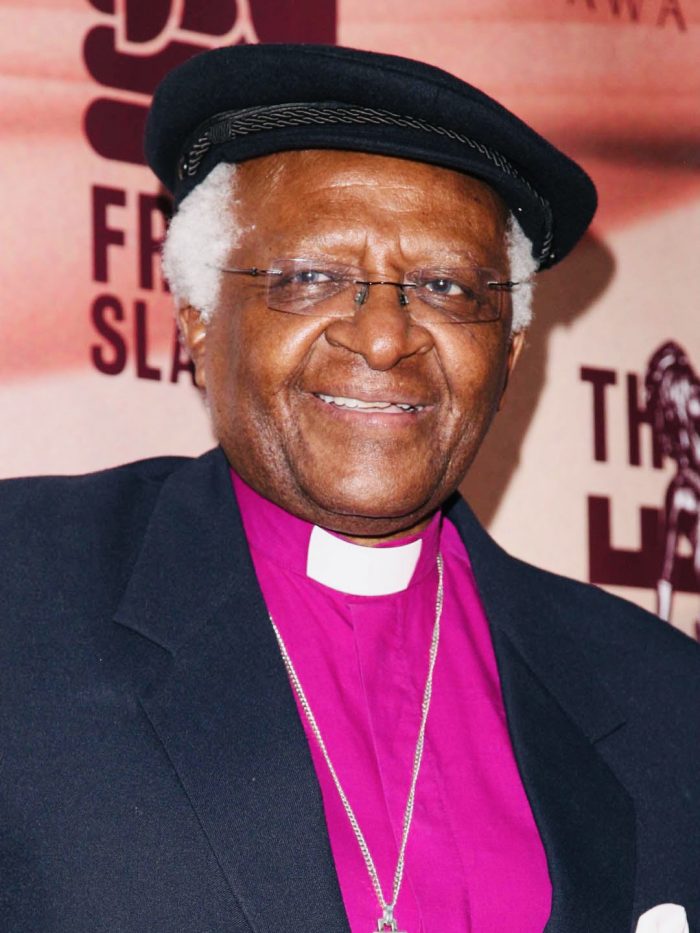
From One Legendary Leader in the Evening to Another One in the Morning–a Tribute to Archbishop Desmond Tutu

The beloved late Desmond Tutu (photo: Yaw Perbi does not own the rights to the picture and owner is unknown).
I was emailed this incredible tribute by a mentor of mine in the Lausanne Movement, Dr. Michael Cassidy, to his late friend Archbishop Desmond Tutu, that I just had to share as a student of leadership. What impresses you most? May many Cassidies and Tutus be raised in our generation!
Tribute to Archbishop Desmond Tutu
from
Michael Cassidy
Founder, African Enterprise
Honorary Chair, The Lausanne Movement
Archbishop Desmond Tutu, one of South Africa’s greatest ever luminaries, both ecclesiastical & national, has gone to be with His Lord. People from every race, sector & background will mourn his passing, because he was a man for all who stood without fear or favour for the human rights of all.
Perhaps it is as an almost unequalled African champion for human rights that he will be most fondly & universally remembered. And it was for this that he justly became a Nobel Laureate.
In South Africa his immensely courageous fight against Apartheid earned him the fearsome opprobrium of the National Party Government, the settled hostility of most whites, but the thankful adoration of all people of colour, as well as more liberal whites. In fact, from the church, his voice during those dread years, was by far the most audible, & his persona by far the most visible. This audibility & visibility constituted a true achievement of note & contributed powerfully to the final fall of Apartheid.
As far as we were concerned in African Enterprise, Desmond was a friend to our work & contributed powerfully to conferences we organized or helped organize such as SACLA (South African Christian Leadership Assembly), the NIR (National Initiative for Reconciliation), & The Rustenburg Conference which represented the whole church spectrum & spoke to the whole range of political leadership from far left to far right.
At a personal level I also counted Desmond a good friend. He commended numbers of my books, including my recent Memoirs, & wrote the Foreword to my book The Politics of Love. We also shared in significant ministry together in African Enterprise’s city-wide mission to Kigali, Rwanda, a year after the genocide. That was very moving. I especially remember ministering with him in terrifying cells of pitifully jammed together prisoners. And then being with him as he collapsed in tears in one church filled with skeletal remains of murdered victims. There I saw his profound compassion poured out. Even as we tried to hold him up. Such shared moments one can never forget, culminating in our sharing the evangelistic preaching to a packed stadium in our final service.
And all this Desmond could do in spite of the fact that we had strong theological differences on certain issues such as Universalism & Gay Marriage. But he never allowed those to damage our friendship. And neither did I.
Thankfully in our recently produced documentary, The Threatened Miracle of South Africa’s Democracy, Desmond features strongly, both during the Apartheid years, but even afterwards when he severely scolded the ANC of Zuma’s time saying, “I’m warning you; I’m WARNING you; you are a disgrace!” No one else had that truly prophetic courage, credibility & ability to speak to all sides, all the time, AND be heard!
Yes, we will miss him… “the Arch”, as he was affectionately known, even by the media. But his legacy of prophetic witness will live on wherever South Africa’s story is told, & wherever racial justice & the Human Rights struggle are in purview.
To his dear, always supportive wife Leah, to his family, to his ministry colleagues, especially in the Anglican Church, we in African Enterprise world-wide extend our deepest sympathies, & assurances of heart-felt prayers at this time.
Dear Desmond — Beloved Arch — thank you for blessing us with your life. Au revoir. We will see you in the Morning.
Michael Cassidy
Founder of African Enterprise

Whoever Takes the Son Gets It All
Years ago, there was a very wealthy man who, with his devoted young son, shared a passion for art collecting. Together they traveled around the world, adding only the finest art treasures to their collection. Priceless works by Picasso, Van Gogh, Monet and many others adorned the walls of the family estate. The widowed, elder man looked on with satisfaction as his only child became an experienced art collector. The son’s trained eye and sharp business mind caused his father to beam with pride as they dealt with art collectors around the world.
As winter approached, war engulfed the nation, and the young man left to serve his country. After only a few short weeks, his father received a telegram. His beloved son was missing in action. The art collector anxiously awaited more news, fearing he would never see his son again. Within days, his fears were confirmed. The young man had died while rushing a fellow soldier to a medic.
Distraught and lonely, the old man faced the upcoming Christmas holidays with anguish and sadness. The joy of the season, a season that he and his son had so looked forward to, would visit his house no longer. On Christmas morning, a knock on the door awakened the depressed old man. As he walked to the door, the masterpieces of art on the walls only reminded him that his son was not coming home.
As he opened the door, he was greeted by a soldier with a large package in his hand. He introduced himself to the man by saying, “I was a friend of your son. I was the one he was rescuing when he died. May I come in for a few moments? I have something to show you.” As the two began to talk, the soldier told of how the man’s son had told everyone of his, not to mention his father’s, love of fine art. “I’m an artist,” said the soldier, “and I want to give you this.” As the old man unwrapped the package, the paper gave way to reveal a portrait of the son.
Though the world would never consider it the work of a genius, the painting featured the young man’s face in striking detail. Overcome with emotion, the man thanked the soldier, promising to hang the picture over the fireplace.
A few hours later, after the soldier had departed, the old man set about his task. True to his word, the painting went well above the fireplace, pushing aside thousands of dollars of paintings. And then the man sat in his chair and spent Christmas gazing at the gift he had been given. During the days and weeks that followed, the man realized that even though his son was no longer with him, the boy’s life would live on because of those he had touched. He would soon learn that his son had rescued dozens of wounded soldiers before a bullet stilled his caring heart.
As the stories of his son’s gallantry continued to reach him, fatherly pride and satisfaction began to ease the grief. The painting of his son soon became his most prized possession, far eclipsing any interest in the pieces for which museums around the world clamored. He told his neighbors it was the greatest gift he had ever received.
The following spring, the old man became ill and passed away. The art world was in anticipation! Unmindful of the story of the man’s only son, but in his honor, those paintings would be sold at an auction. According to the will of the old man, all of the art works would be auctioned on Christmas day, the day he had received his greatest gift. The day soon arrived and art collectors from around the world gathered to bid on some of the world’s most spectacular paintings. Dreams would be fulfilled this day; greatness would be achieved as many claim “I have the greatest collection.”
The auction began with a painting that was not on any museum’s list. It was the painting of the man’s son. The auctioneer asked for an opening bid. The room was silent.
“Who will open the bidding with $100?” he asked.
Minutes passed. No one spoke. From the back of the room came, “Who cares about that painting? It’s just a picture of his son. Let’s forget it and go on to the good stuff.”
More voices echoed in agreement. “No, we have to sell this one first,” replied the auctioneer. “Now, who will take the son?”
Finally, a friend of the old man spoke, “Will you take ten dollars for the painting? That’s all I have. I knew the boy, so I’d like to have it.”
“I have ten dollars. Will anyone go higher?” called the auctioneer.
After more silence, the auctioneer said, “Going once, going twice. Gone.” The gavel fell, cheers filled the room and someone exclaimed, “Now we can get on with it and we can bid on these treasures!”
The auctioneer looked at the audience and announced the auction was over. Stunned disbelief quieted the room. Someone spoke up and asked, “What do you mean it’s over? We didn’t come here for a picture of some old guy’s son. What about all of these paintings? There are millions of dollars of art here! I demand that you explain what’s going on here!” The auctioneer replied, “It’s very simple. According to the will of the father, whoever takes the son…gets it all.”
Puts things into perspective doesn’t it? Just as those art collectors discovered on that Christmas Day, the message is still the same: the love of a Father, a Father whose greatest joy came from His Son, who went away and gave His life rescuing others. And because of that Father’s love, whoever takes the Son, gets it all.
– Unknown

THE PRESENCE ~ Part 1 (of 3)
As I prayerfully pondered how best to enter 2022 personally as well as what to share with a church plant on the Akuapem mountains (in the Eastern Region of Ghana) that had invited me as guest preacher for their Watch Night service, THE PRESENCE became overwhelming clear.
WHAT DO YOU WANT FOR 2022?
Take a pause and sincerely answer the question: What do I want for 2022? How about THE PRESENCE as a present? Yes, God is everywhere (omnipresent) so why does He say where two or three are gathered in His name He is present, among them? God can choose to concentrate His presence in a person or place, and that is what I mean by THE PRESENCE. My aim is to show that everything you need for 2022 is in THE PRESENCE of the LORD; all you’ll ever want is in THE PRESENCE. At the end of this, my prayer is that like the Mariah Carey song, “All I want for Christmas is you,” you’ll leave here saying, “Dear God, all I need for the New Year is YOU!” so “All I want for the New Year, is YOU!”
HEAVEN CAN BE HELL
Four years ago, when I was still president of ISMCanada, I led a team to organize our biennial staff conference for most of our 100 staff from coast to coast to come to McGill University in Montreal, on the east coast of Canada. One of the devotional speakers I arranged to exhort the conference attendees was a young pastor (he’s a white African from Zimbabwe) from the Peoples Church of Montreal. Pastor Chris asked a question that I would like to repeat: HOW MANY OF YOU WOULD STILL LOVE TO BE IN HEAVEN EVEN IF GOD WASN’T THERE? My own response revealed my heart and I was shocked. I realized to my utter shock and shame, I didn’t really mind being in Heaven—the golden streets, tree of life, worship music, peace, no more sickness, sweat or tears…—even if God was absent.
But really, WHAT IS HEAVEN WITHOUT GOD? Heaven without God is hell! Samuel Rutherford put it this way, “O my Lord Jesus Christ, if I could be in heaven without thee, it would be a hell; and if I could be in hell, and have thee still, it would be a heaven to me, for thou art all the heaven I want.” Teresa of Avila said, “Wherever God is, there is heaven.” And for John Milton, “Thy presence makes our paradise, and where thou art is heaven.” Simply put, God’s presence is paradise.
Now, let me ask you: WOULD STILL LOVE TO ENTER 2022 EVEN IF GOD WASN’T THERE? 2022 without God is hell. Yet even Covid in 2022 with God is heaven. Everything you need is in the Presence of Yahweh; is it protection, provision, guidance, favour, promotion, strength…? It’s in all in THE PRESENCE. For many of us, we don’t mind having this stuff without God coming along! We want his hand but not his face; we want his stuff but not him. That is a tragedy of our times; an error!
SPIRIT-SATURATED SIMEON
This last Christmas season, I was really challenged by the Spirit-led life of Simeon in Luke 2. He was a righteous and devout man in Jerusalem who Joseph and Mary met when the time came for the purification rites required by the Law of Moses, and they took Jesus to Jerusalem to present him to the Lord. Interestingly, my main text for this message, Exodus 13, begins by explaining that what was written in the Law of the Lord—“Every firstborn male is to be consecrated to the Lord”—was part of the Exodus story as God killed all the firstborns of Egypt and spared the Israelites’.
Simeon was no special person per se—not a priest, prophet, pharisee, politician—just an ordinary guy who thought right, acted right, was in right and intimate relationship with the LORD and devoted to Him. He was waiting for the promised Jewish Messiah (“the consolation of Israel,” they would say) and the Holy Spirit was on him [THE PRESENCE]. It had been revealed to him by the Holy Spirit that he would not die before he had seen the Lord’s Messiah. Someone reading this needs revelation in 2022; it’s in THE PRESENCE.
Just check out at the intimacy in THE PRESENCE—such a deep thing that thousands of generations had waited for in faith, and God chooses to promise this sight to simple Simeon! It reminds me of Abraham’s intimacy with the LORD to the extent that God said, before he would rain judgment on Sodom & Gomorrah, “shall I hide what I’m about to do from Abraham].
Moved by the Spirit [THE PRESENCE compels, propels], he went into the temple courts right when the parents brought in the child Jesus to do for him what the custom of the Law required. Indeed, the steps of the righteous are ordered by THE PRESENCE]. Simeon took him in his arms [may you too take hold of and take delivery of God’s promises in 2022 by THE PRESENCE] and praised God [there is praise in THE PRESENCE], saying some amazing things which made Mary and Joseph “marvel” (v. 33), including prophesying some incredible things like the crucifixion, all of which could only have been revelation. Such is the life of an individual in THE PRESENCE.
In Part 2, I share about the remarkable Israelites-in-the-desert example of THE PRESENCE, so well-summarized in the following famous two-stanza Wesleyan hymn:
Captain of Israel’s host, and Guide
Of all who seek the land above,
Beneath Thy shadow we abide,
The cloud of Thy protecting love;
Our strength, Thy grace, our rule, Thy Word;
Our end, the glory of the Lord.
By Thine unerring Spirit led,
We shall not in the desert stray
We shall not full direction need
Nor miss our providential way;
As far from danger as from fear,
While Love, almighty Love, is near.
Find Part 2 here.
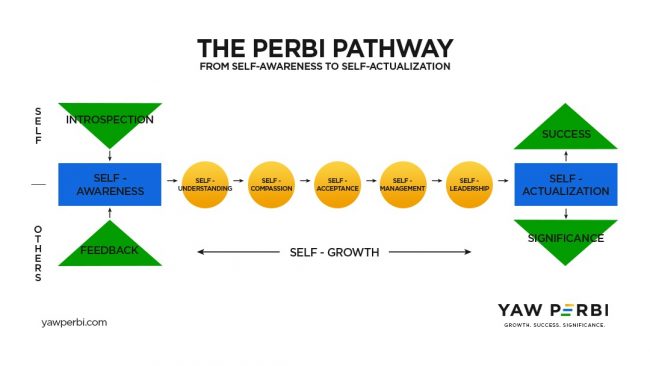
Is ‘Self-Leadership’ Really a Thing?
When the CEO of TNYOU, short for The New YOU, a leading health and wellness movement asked me to speak to a group of their Queens (members) on ‘self leadership’ it felt odd on three levels. I still showed up anyway, grateful for the invite, because Sena told me there was going to be a lot of women there so how could I turn down the invitation? I am very heterosexual!
Firstly, it felt odd because not everyone believes in the concept of ‘self leadership.’ During my graduate studies in leadership I came across leadership authorities in academia like Northouse who believe ‘self leadership’ is an oxymoron because leadership by definition per se is about other people, not one’s person.
The second reason it felt odd was that it seemed to me I was preaching to the choir. These were all women who had taken charge of their lives, self-leadership, to get their health and happiness on track. What more was there to tell them?
My third and final reason was personal: I suspect Sena Yeboah had asked me to speak on self-leadership because not only am I a leadership authority (I’m actually even undergoing doctoral studies in global leadership at the moment) but I’ve also been big on self leadership in my personal life for years and very successful in most areas (discipline of staying in medical school or to author and publish 20 books or choosing to abstain from sex before and outside of marriage or family planning for seven children etc.). The irony is that the one area I have failed miserably at in exhibiting strong self-leadership has been my personal health, particularly since the pandemic. I was very active before Covid-19 hit, sometimes doing nearly 70 flights per year and all but now both the pandemic viral curve and the curve of my abdomen had risen in tandem. What an embarrassment to stand before women who had exhibited self-leadership to look trim and prim!
I’m glad that in the spirit of authentic leadership I confessed my sin and shared my repentance story that over the previous four weeks I had now taken self-leadership regarding my health and had been working with a physical trainer/coach actually recommended to me by Sena since there’s no TNYOUMen, yet.
SO WHAT IS SELF-LEADERSHIP?
As far as I know, Charles Manz was the first to use the term ‘Self-leadership’ way back in 1983 and defined it as “a comprehensive self-influence perspective that concerns leading oneself.” The father of modern management, Peter Drucker, wades in (2010) to say that being a self-leader is to serve as chief, captain, or CEO of one’s own life. Brian Tracy talks about setting goals and taking full responsibility for that goal. The concept of self-leadership, also known as personal mastery, can be found in the writings of philosophers and poets, both Eastern and Western:
“Mastering others is strength. Mastering yourself is true power.” – Lao Tzu (born 571 BC)
“I am the master of my fate, I am the captain of my soul.” – William Ernest Henley (1849–1903)
HOW SELF-LEADERSHIP CAN BE EXPLAINED
How differently would you live your life if you saw yourself as a company and run your life that way—Me Inc.? What are some of the things your company/organizational leaders do to make it successful? A leader is a response-able PERSON who serves and influences PEOPLE to achieve a shared, noble PURPOSE. Person-People-Purpose. Because of middle P, there is a school of thought that there is nothing like self-leadership, an oxymoron, but I beg to differ: If leadership is about responsibility, serving and influencing PEOPLE, then how about starting with the FIRST PERSON, which is yourself/myself?
You should know by now that the hardest person to lead is yourself/myself! Self-leadership then is being response-able, serving and influencing oneself (one’s PERSON) to achieve a noble purpose. This purpose could be an overall life purpose or in a specific area of your life: professional, financial, health/wellness, intellectual/academic, social/relationships, spiritual. Self-leadership is to:
*Be response-able for your life. Take charge/you are in-charge. I cannot keep letting my body do whatever it wants—from my mouth to the rod in between my legs.
*Influence yourself. Influence your thinking by what you choose to read or watch, including on social media. Recently I decided to influence myself towards finishing up a book and sending it off to the publishers by promising myself my favourite Chinese food at my favourite Chinese restaurant in Accra on the day I meet that goal!
*Service yourself. Everyone needs a daily growth time; everyone, everyday. Serving yourself may sound selfish but do not confuse self-care with selfish. Even to obey the great commandant to “love your neighbor as yourself,” you can only love a neighbour to the extent that you love yourself. A classic illustration of this truism might be how on an airline the safety instruction is that in the event of a loss in cabin pressure, when the oxygen masks drop down put one on your own face first before attempting to help any others. It might seem very noble to try and save that little child next to you or the old lady already collapsing across the aisle but without taking care of you first, we might end up with two casualties instead of one: you the attempted helper and the one you were attempting to save.
TEAMS, DNA & EVERYTHING LEADERSHIP
Take a good look at every responsibility of company leadership and find an application or parallel with your own life. One of your first acts of leadership is to recruit your leadership team. Gather the right community of people around you. Even better still have TEAMS—Together Everyone Achieves Most Success. You need mentors above (coaches, teachers, counsellors, spiritual directors etc.), mates at par and mentees who look up to you to form a stable tripod. One of my friends who works with a huge European bank has actually set up a personal board of directors he meets with quarterly–and it’s working wonders for him as we meet with him quarterly (I’m on this board). At least have an accountability partner of Me Inc.
As an executive coach, I still haven’t gotten over the shock every time I meet with a top leader of a company with a compelling mission statement yet this leader hasn’t clearly spelt out and written down their own vision, mission and values! Come on! Take self-leadership now–spend some quality time (even go on a retreat) to determine your life’s vision, mission, values and some goals and strategies towards that end. That is leadership!
SELF-LEADERSHIP NOT THE SAME AS SELF-MANAGEMENT
Leadership and management aren’t one and the same. It stands to reason then that self-leadership should be distinguished from self-management (as seen in the Perbi Pathway from Self-Awareness to Self-Actualization above). While all the differences isn’t the focus of this article, suffice it to say that self-management is doing the right things for your flourishing while self-leadership is determining what the right things are in the first place. The difference between leadership and management is starkest when once needs to make a major life change. Self-leadership is able to chart and change course; self-management is able to stay the course (consistency).
Self-management would be the planning, budgeting, organizing and staffing, monitoring results, coordination… everything systems and processes to create a stable, productive environment with consistent life results. Self-leadership, on the other hand, would be building a strong personal foundation, defining DNA (vision, mission, values), mapping strategy, inspiring commitment, equipping others for the journey, leading the way… everything that creates constructive change for definitive and (often) different results.
IT IS A THING!
Self-leadership is a thing and we had better get on with it. Be response-able for you, influence and serve yourself towards personal success and societal significance. There is a company called Me Inc. [replace ‘me’ with your name, if you like]. How’s your company doing? How is your brand? For me, at the moment, it’s taking charge of my weight and wellness that will do it. What is it for you?

